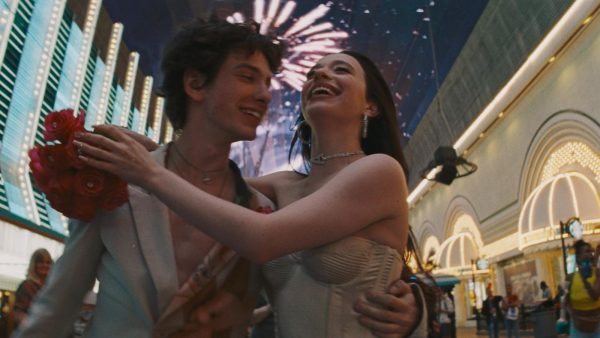
If the first half of Sean Baker’s “Anora” evokes a euphoric high, the second half is akin to the subsequent comedown.
The film follows Anora, a Brooklyn stripper played by Mikey Madison, throughout a whirlwind winter in which she is courted by Ivan, the young son of wealthy Russian oligarch played by Mark Eydelshteyn. However, the Cinderella story hits a snag when word spreads of their impromptu wedding, prompting Ivan’s parents to send his godfather and goons to annul the marriage.
“Anora” marks Mikey Madison’s first leading role following her notable performances in 2019’s “Once Upon a Time… in Hollywood” and 2022’s “Scream.” Thankfully, the film’s script does not call for her to be burned alive, something she endured in both blockbusters. Instead, her pain in “Anora” is more psychological than physical, encompassing the stigma surrounding sex work. This is common in Sean Baker films, as the director tends to focus on America’s underclass; “Tangerine” focuses on transgender sex workers and “The Florida Project” follows an impoverished single mother. Despite the increasing acceptance of sex work in recent years, partially induced by the advent of Only Fans, the industry still operates as an exploitative system.
For much of the film’s first half, Anora – who insists on going by Ani – is decidedly in control of her narrative. She takes charge in the strip club she works at, earning as much money as possible from her sleazy clientele. Ani’s initial run-in with Ivan is facilitated by her adequate proficiency in Russian. She lures him to a VIP room, raking in an even higher sum from the wealthy man. From that night on, Ivan becomes infatuated with Ani, soliciting her for sex numerous times. Eventually, he asks her to pose as his girlfriend for the week, for which she negotiates a price of $15,000. She stands to gain a lot from her position as his exclusive escort – a private jet, a suite in Las Vegas, a new wardrobe, a massive Brooklyn mansion – and she leverages it accordingly. The two seem to develop a genuine relationship, one untethered from the initial economic and erotic incentives. Following a spontaneous marriage proposal by Ivan in Las Vegas, the two are wed in a nondescript chapel.
However, the scales tilt against Ani when Russian social media gets wind of their elopement. Ivan’s parents are furious to hear the news that their son married a prostitute, so they send their lackeys to force an immediate annulment. Toros – Ivan’s godfather played by Karren Karagulian – and Garnick and Igor – two henchmen – break into the Brooklyn mansion, demanding that the newlywed couple separate for good. Ivan runs away, leaving Ani at the mercy of the goons. From that point on, her romance unravels and it becomes clear that she is merely a pawn in Ivan’s act of rebellion against his parents.
The hypocrisy of Ivan’s camp is stark, as they see no problem with him paying Ani for a dance or for sex, yet they draw the line at marriage, solely because that forces them to acknowledge her as more than just a body. In the wake of Ivan’s absence, Ani is subject to a difficult scene where her bodily autonomy is completely disregarded while the goons throw her around. She is subject to disparaging comments about her profession and relationship with Ivan; Toros even states that if she is pregnant, she will be forced to terminate the pregnancy.
Character development is non-existent in the movie; if anything, everyone experiences some kind of regression. Ani bears the brunt of this, punctuated by the film’s final scene. After begrudgingly finalizing the annulment, Ani is unceremoniously sent back home with Igor, played by Yura Borisov. When he drops her off at her house, he hands Anora the wedding ring that was forcibly confiscated from her. She appears to process his small act of kindness, then initiates car sex. With the only sound coming from the snowfall outside, the tryst appears cold and awkward. In initiating this sex scene, Ani attempts in vain to reclaim her body after having her own right to determination disregarded. When Igor leans in to kiss Ani, her usually fierce demeanor cracks and the reality of the situation hits her all at once. She realizes that she has been deeply impacted, as she has had her dignity stripped away.
“Anora” has the potential to spark a myriad of conversations, particularly for its use of female nudity. Throughout Hollywood history, a disproportionate number of women have chosen to do nude scenes compared to men. For some actresses, having a say over what they show the audience is an empowering choice. Still, it raises the question of whether the practice is inherently exploitative because there is the assumption that a woman may go fully nude; male actors, on the other hand, rarely have to make that decision. Madison choosing to be nude in certain scenes neither adds nor detracts from the film’s message.
Sean Baker’s directorial talent shines in his devotion to the “old” ways of filmmaking. “Anora” was shot on Kodak 35mm film, creating some stunning shots of New York City in the winter. He gives his scenes room to breathe, a lost art in the age of instant gratification. Jump cuts in the first act to parallel the drug and alcohol use that fuels Ani’s and Ivan’s attraction to the long, open shots that mirror how things have suddenly become real are unsettling just by virtue of being so different.
Baker and Madison ask us to consider important questions about how we treat women broadly and sex workers specifically in his screwball Cinderella story that seems likely to be an Oscar favorite.




Leave a Comment